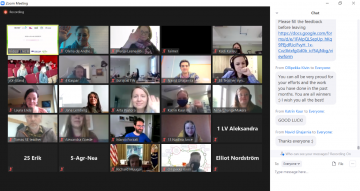Challenges to Business-BootCamp 5.-6.5.2021
Day 1: Creating dynamics of cross-border collaboration through a Negotiation Game
At the 1st day, international teams, that were formed last October, met online and some of them even offline, depending on the respective COVID-19 restrictions for each individual country and school. The main activity for the 1st day was a Cross-Sectoral Negotiation prepared by Stockholm University.
Negotiation Game about the Baltic Sea
The topic of the Game was the Environmental condition of the Baltic Sea that is drastically impaired by eutrophication. This is caused by too many nutrients in the water, which are mainly a result of human activities around the Baltic Sea, such as agriculture or shipping. Eutrophication leads to algae blooms and low oxygen levels in the water, which in turn threaten the marine ecosystems and decrease the biodiversity in the Baltic Sea. It is an important and urgent matter that can only be solved by collaboration between different sectors. The negotiation game aims to simulate the process of finding an agreement for different measures and solutions to fix eutrophication in the Baltic Sea. It includes five actors, that are Agriculture, Fisheries, Environmental Organizations, Governments, and Industries. 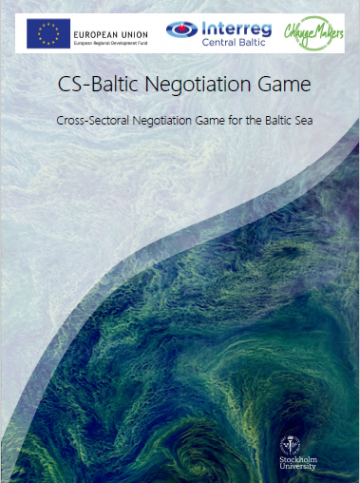 These actors all have different interests and preferences that are represented by the players with the respective role. The basis of the negotiation are 10 solutions that can help to improve the environmental condition of the Baltic Sea.
These actors all have different interests and preferences that are represented by the players with the respective role. The basis of the negotiation are 10 solutions that can help to improve the environmental condition of the Baltic Sea. 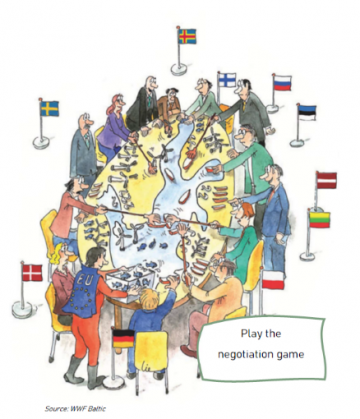 These include restrictions on agricultural activities, eco-technologies, an improved sewage and wastewater management, or regulations of sea-based activities. The goal for the players is then to negotiate and agree together on three of these solutions.
These include restrictions on agricultural activities, eco-technologies, an improved sewage and wastewater management, or regulations of sea-based activities. The goal for the players is then to negotiate and agree together on three of these solutions.
Watch the introduction video of the game: https://www.youtube.com/watch?v=wCm_fD1WOk4
Playing the game together
The ChangeMakers students were divided into seven game playing groups, so that 2-3 students would represent each actor role together. Because of the pandemic, all students had to play online. And organising seven groups and 42 break-out rooms in Zoom was a challenge in itself.
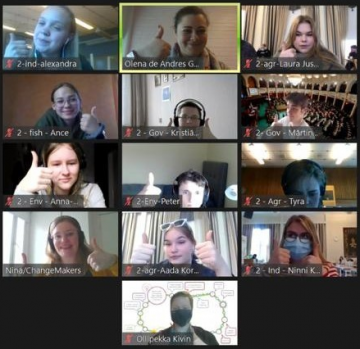 To support and manage this, 14 teachers and project workers acted as moderators to guide the students in the negotiation processes as well as to organise the technical difficulties. Despite only meeting online, the students showed great interest and enthusiasm for the subject. They passionately represented their respective roles and fought for their own interests. While
To support and manage this, 14 teachers and project workers acted as moderators to guide the students in the negotiation processes as well as to organise the technical difficulties. Despite only meeting online, the students showed great interest and enthusiasm for the subject. They passionately represented their respective roles and fought for their own interests. While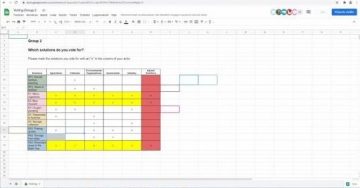 discussing and negotiating, they understood that everyone has to make compromises in order to reach an agreement. The students could learn why negotiations in the real world take such a long time and how difficult it is to find a common ground with actors who have conflicting interests. Six out of seven groups reached an agreement at the end of the day, often with more than three solutions.
discussing and negotiating, they understood that everyone has to make compromises in order to reach an agreement. The students could learn why negotiations in the real world take such a long time and how difficult it is to find a common ground with actors who have conflicting interests. Six out of seven groups reached an agreement at the end of the day, often with more than three solutions.
Day 2: Pitching and the winning teams of the Dragon’s Den Challenges to business Bootcamp
On the 5-6th of May Central Baltic ChangeMakers project held an online BootCamp with challenges for almost 125 students from Finland, Åland, Sweden, Estonia, and Latvia.
At the 2nd day of the BootCamp, teams were prepared to defend their sustainable solutions of their favourite challenges from the total amount of 14 challenges in the project. The challenges were created in collaboration with real-life companies. In the beginning of the day, 24 international student start-ups, five carefully chosen international Jury members, mentors, experts and project staff were prepared for the pitching battle. During the pitching day, all pre-prepared pitching videos were shown to the jury members and the teams were asked questions by the members and the audience. By the end of the day, the project had altogether 8 winners from different chosen categories. In addition to a jury favourite prize and an audience prize, each partner organization gave their prices to the winners of selected categories.
The Jury favourite: Turning sludge into eco-friendly fertilizer by drying it
In fishing industry water will continually be purified in biofilters in a cultivation process. The same water is being reused repeatedly. As a result, company Fifax AB is facing the overabundance of fish sludge in their tanks, which needs to be taken care of. The winning team came up with a solution in which the extra sludge will be compressed into eco-friendly fertilizer. 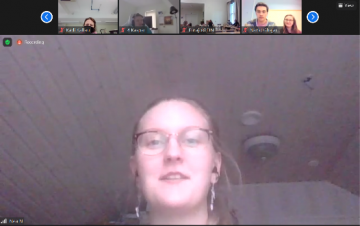 The team had considered the business potential and the marketing aspects of their product by interviewing potential customers, farmers, whether they would be interested in their product. Overall, the winning team was able to achieve great results in all jury categories (such as sustainability, business potential, idea, presentation, and background preparation).
The team had considered the business potential and the marketing aspects of their product by interviewing potential customers, farmers, whether they would be interested in their product. Overall, the winning team was able to achieve great results in all jury categories (such as sustainability, business potential, idea, presentation, and background preparation).
Best technical solution: Team Chargerbots – Efficient electric car charging robot
The inconvenience of finding a place for charging one’s electric car is sometimes a challenge. Team charge robots came up with a solution in which a smart autonomous robot, moving under the car by itself, an electric car may be charged anywhere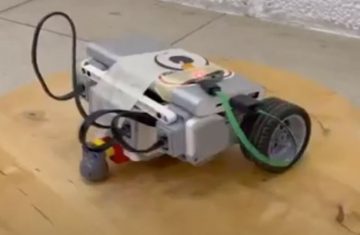 at any time. ChangeMakers partner Tallinn Technical University (Taltech) awarded the team in a category of best technical solution. The team used for example a Lego Mindstorm kits and a wireless phone charger to build the winning prototype.
at any time. ChangeMakers partner Tallinn Technical University (Taltech) awarded the team in a category of best technical solution. The team used for example a Lego Mindstorm kits and a wireless phone charger to build the winning prototype.
Best product design: Potato shampoo from potato juice
Aloja-Starkelsen food company from Latvia was looking for best ways to utilize the leftover potato juice delivered from their production line of potato starch.
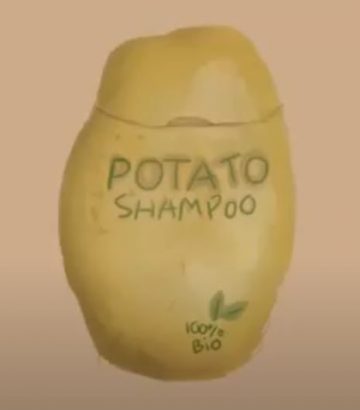 The team came up with a potato hair shampoo. The lead partner of the project, University of Turku, awarded the team for having the best product design. The product bottle was found interesting, fun and innovative. This product will definitely stand out from other products in the shampoo aisle.
The team came up with a potato hair shampoo. The lead partner of the project, University of Turku, awarded the team for having the best product design. The product bottle was found interesting, fun and innovative. This product will definitely stand out from other products in the shampoo aisle.
Read an interview of the team here: https://bit.ly/3wVgb5x
Most business potential: Team Solar guys – a solar bench
The challenge behind this solution was to find ways to utilize solar panels and promote solar energy among manufacturing companies. After a careful thought, the team came up with a solar bench that utilizes solar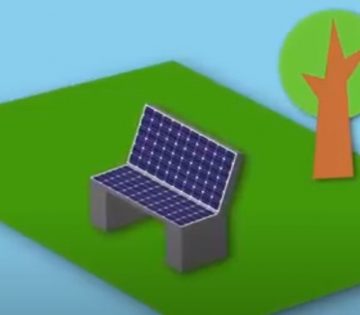 panels and can be used e.g. in parks. Satakunta University of Applied Sciences found this solution to have the best business potential. The idea was all in all very well thought and it can be implemented with modest resources. The solution was found simple enough for production, sustainable and it showed attractiveness.
panels and can be used e.g. in parks. Satakunta University of Applied Sciences found this solution to have the best business potential. The idea was all in all very well thought and it can be implemented with modest resources. The solution was found simple enough for production, sustainable and it showed attractiveness.
Best Pitching Performance (commitment/sales performance): Green Tee: An app to find green clothes
Textile industry is a remarkable source of pollution and greenhouse gas emissions. The idea of the Green Tee app is to help consumers to compare different brands when making buyer’s decisions and to avoid green washing. The 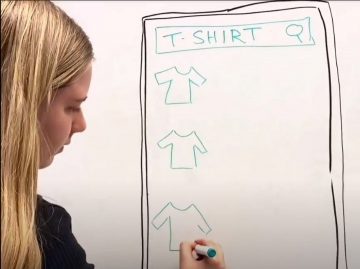 group’s logan says it all: “Buying green doesn’t have to be difficult”. The group also used drawing techniques in their video to demonstrate their idea. The ChangeMakers partner Åland Vocational School (ÅYG) awarded the team in the category of best pitching performance.
group’s logan says it all: “Buying green doesn’t have to be difficult”. The group also used drawing techniques in their video to demonstrate their idea. The ChangeMakers partner Åland Vocational School (ÅYG) awarded the team in the category of best pitching performance.
Thinking outside the box / most creative solution: Styrofoam eating mealworms
The Baltic Sea is facing the threat of plastic pollution, which affects local flora and fauna. Especially light styrofoam is a problem as it ends up in the sea easily and breaks into small pieces. Instead of coming up with a more traditional cleaning solution of the Baltic Sea, the group planned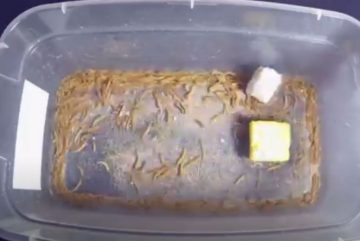 to use Styrofoam eating mealforms. This interesting idea is based on studies made at the Stanford University. The CM partner Riga Technical University awarded the team with the best thinking outside the box idea.
to use Styrofoam eating mealforms. This interesting idea is based on studies made at the Stanford University. The CM partner Riga Technical University awarded the team with the best thinking outside the box idea.
Most sustainable solution: BambOwO – Cinnabon bamboo cups to replace plastic cups
Usage of disposable cups in public events is consuming to the nature. Team BambOwO uses bamboo as a replacement material for traditionally used plastic. The product provides a plastic-free and reusable alternative to the 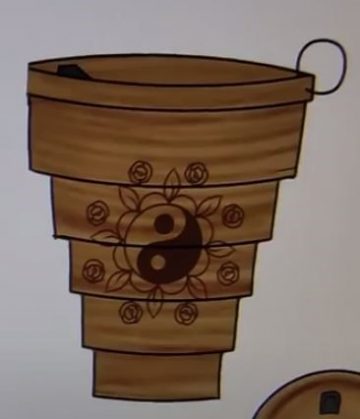 standard cup, while remaining stylish. Together with silicone, which allows the folding quality of the cup and a microchip system, which allows customers to reuse the product through a rewarding system, the solution offers a sustainable alternative in drinkware industry. The CM project partner Stockholm University awarded this solution as the most sustainable solution.
standard cup, while remaining stylish. Together with silicone, which allows the folding quality of the cup and a microchip system, which allows customers to reuse the product through a rewarding system, the solution offers a sustainable alternative in drinkware industry. The CM project partner Stockholm University awarded this solution as the most sustainable solution.
Audience prize: ECOncrete – Revolutionize concrete manufacturing through excess rainwater
For the winner of the audience prize, the students voted their favourites through a MentiMeter application. This prize was won by team ECOncrete, whose idea was to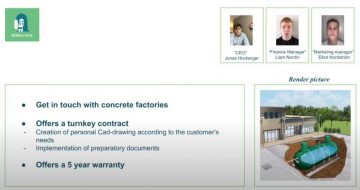 reuse storm water in concrete manufacturing processes. The team already had a clear vision of its target market: Northern India!
reuse storm water in concrete manufacturing processes. The team already had a clear vision of its target market: Northern India!
Great results in the project
What a battle it was! Happy winners will receive their prizes and all hardly working participants diplomas. All participants also gained experience in cooperation, negotiation, teamwork and of course in creation of sustainable friendly start-ups for any kind of challenges what they could meet in their lives. The project congratulates all the participants of the first round!
And ChangeMakers CentralBaltic project continues. All kinds of feedback, teacher workshops, meetings, preparations of new challenges and learning materials – work is going on. See you at the Round 2!
If you are interested, you can find all videos about challenges at our YouTube channel by this link: https://www.youtube.com/channel/UCRqvEPmL6VhNO8eltkhUrfg.
